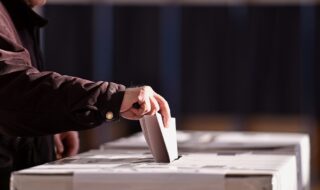November 6, 2024
Election 2024: Tie In Minnesota House Could Be Good For Small Businesses
On Tuesday, Minnesota didn’t see the political earthquake that some on both sides had predicted before the election. Instead, voters delivered a muted rebuke of Democrats that will end all-DFL control of state government – sort of.
Prior to the election, Democrats and Republicans expressed optimism for very similar reasons: Governor Tim Walz being on the ballot as Vice President Harris’s running mate.
Democrats saw this as an opportunity energize their base and independent votes who may be excited to put a Minnesotan close to the White House. Republicans saw the selection of Walz as a galvanizing event for conservatives and independents put off by the state’s lurch to the far left over the past two years.
Although the electoral dust is not completely settled in Minnesota, it seems neither side was proven right.
For now, this is good news for small business owners in the state. NFIB’s endorsed candidates performed well and the tie should force more moderate solutions to the challenges facing Minnesota.
Minnesota Legislature
Minnesota Senate: In the winner-take-majority special election for Minnesota Senate District 45, Democrat Ann Johnson Stewart defeated Republican Kathleen Fowke by five points – a marked improvement of seven points for Fowke over her 2022 loss.
This seat was vacated by U.S. Rep-elect Kelly Morrison (MN-03).
Johnson Stewart’s win restores the DFL’s 34-33 majority, although the Nicole Mitchell (D-Woodbury) burglary charges remain unresolved.
Minnesota House: For the main event… the Minnesota House is currently tied at 67 Democrats and 67 Republicans. At least two seats will go to automatic recounts due to margins of less than 0.5%. Both were won by incumbent Democrats:
– St. Cloud (14B): Wolgamott (D) +28 votes
– Shakopee (54A): Tabke +13 votes
Recounts in other races are possible but unlikely, as the cost falls on the contesting party and recounts are expensive to administer and the odds of changing the outcome are very long.
The Republicans got to a tie by picking up three seats:
– Iron Range (7B): Cal Warwas def. Lorrie Janatopoulos, 56% to 44%
Warwas’ victory is another sign of the massive shift in political allegiance in Northern Minnesota. This district was one of the last DFL holdouts on the Range.
– St. Peter/North Mankato (18A): Erika Schwartz def. Rep. Jeff Brand, 52% to 48%
This seat is becoming a bellwether for the state, as it’s gone back and forth between the parties in the last two elections. When Republicans win here, they gain seats statewide. When Democrats win here, they’ve been able to hold onto control in St. Paul.
– Winona (26A): Aaron Repinski def. Sarah Kruger, 53% to 47%
This district had been held by moderate DFLer Gene Pelowski for 38 years, even as the rest of Southeastern Minnesota shifted toward the right. Repinski’s victory completes the realignment for the GOP in this part of the state.
Democrats were able to avoid going into the minority by retaining suburban districts they’ve mostly held since 2018. In addition to Shakopee, Democrats scored narrow victories in Anoka, Blaine, Chaska, and Coon Rapids.
What’s Happening? Three trends are notable and could prove important in future legislative elections:
1) Republicans grew their margins in non-competitive Greater Minnesota and the Twin Cities Exurbs. The wide margins in some of these seats are starting to rival margins in DFL strongholds like Minneapolis, St. Paul, and the first ring suburbs (30% to 50% margins of victory in contested seats).
2) Republicans also grew their margins and flipped seats in competitive races in regional centers throughout Greater Minnesota. History says Republicans will continue to grow their margins in some of these places, at least for a time. However, opportunities are shrinking for Republicans outside the metro – only a few truly competitive seats remain, and only one of them is held by a DFLer.
3) Democrats hung on to seats in the Twin Cities suburbs, but their margins of victory aren’t growing. In other words, Democrats are not locking down the suburban swing seats like Republicans have locked down many former swing seats in Greater Minnesota. Because of that, the Democrats path to power in the Minnesota House increasingly runs through ~10 narrowly divided suburbs.
Collectively, these trends could have a big impact on the races for governor and state senate in 2026. Larger MOVs in the exurbs and rural areas provide an opportunity for the right Republican to break the party’s 20-year losing streak in statewide races.
The entire Minnesota Senate is up for election in 2026, and the landscape looks tougher for DFLers after last night as Republicans were able to run up large margins on the more conservative sides of Senate districts currently held by Democrats.
What’s Next? The two parties will have to negotiate how to divide power in the chamber.
In the state’s nearly 170 years, the 134 seat House of Representatives has been tied just once before. In 1978, Republicans scored surprise victories off the backlash to Gov. Wendell Anderson’s resignation and appointment to fill Vice President Mondale’s U.S. Senate seat.
In the negotiations that followed, Democrats bargained for the chairs of the Rules, Taxes, and Appropriations Committees, as well as one vote majorities on the Rules and Taxes Committees. Republicans won the Speaker’s gavel, most other committee chairs, and one vote majorities on subcommittees of Taxes.
You can read more about that episode here: The year the House was tied, and how the two parties made peace … until they didn’t – Session Daily – Minnesota House of Representatives.
Spoiler: it got messy. Expect the same in 2025.
Federal Races
U.S. Sen. Amy Klobuchar won a fourth term over Republican Royce White. However, Klobuchar is on track for her lowest vote share (~56%) to date.
In Minnesota’s Second Congressional District, Rep. Angie Craig won a surprisingly decisive victory over first-time candidate Joe Teirab, 55% to 42%.
In the Third Congressional District, former state Sen. Kelly Morrison scored a 17 point victory in the race to replace outgoing U.S. Rep Dean Phillips. Morrison defeated former state court judge and county commissioner Tad Jude.
All other U.S. House incumbents handily won re-election to the U.S. House (Rep. Emmer, Rep. Stauber, Rep. Fischbach, Rep. Finstad, Rep. McCollum, Rep. Omar).
NFIB is a member-driven organization advocating on behalf of small and independent businesses nationwide.
Related Articles














